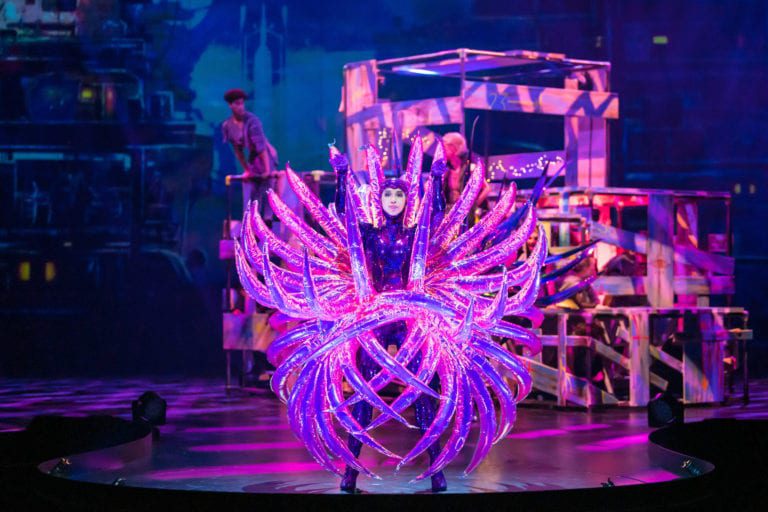Comedy king Bill Murray takes a step back to drink in the elegant vision that is Laura Linney. “Well, look at you,” he enthuses as the pair cross paths while en-route to interviews for their upcoming film Hyde Park on Hudson. “Wow, stunning.” Later Murray, looking for ways to praise Linney, luscious this day in earth tones and soft gold jewellery, notes she is not only quietly revered by her peers for her work as a film, TV and stage actor, but also because “she’s hot.”
“You forget that with some roles … like Daisy,” he says, referring to Linney’s portrayal of American President Franklin D. Roosevelt’s somewhat frumpish, middle-aged, distant cousin turned mistress in Hyde Park on Hudson.
The film’s writer Richard Nelson and director Roger Michell used the letters and notes of real-life Daisy Suckley (she died in 1991, aged 99) as the basis for the biopic. The film centres on the much-beloved American president, played magnificently by Murray, and his wife Eleanor (Olivia Williams) hosting a 1939 visit from the “stuttering” King George VI.
The British king (Samuel West) and his wife Elizabeth (Olivia Colman) are fish out of water in the Hudson Valley town of Hyde Park, 90 minutes north of New York City where they anxiously seek Roosevelt’s support as the UK prepares for war.
Subtle expression
The tale is narrated by Linney’s Daisy, who the filmmakers postulate had two great goals in life as an ageing unmarried woman – to look after her elderly aunt and have a loving, sexual relationship with Roosevelt, a man of great vision with an apparent penchant for extra martial affairs.
Director Michell says Daisy is “an observer and a portal, our way into the film. She doesn’t say a lot but registers a lot and Laura is brilliant at that”. Indeed, while the slightly awkward
and demure Daisy Suckley is an extreme example, Linney has made a brilliant film career playing relatable though sometimes less than glamorous women, harbouring barely hidden desires and complexities.
In Hyde Park on Hudson she admires Daisy’s “strength of modesty” – a trait that also seems to be a feature of the 49-year-old actor’s attitude to work. “There is something right about it,” Linney says. “She didn’t have to talk about it, just the experience of living through it was enough. No … fuss. I find that a really good lesson, especially in these days when everything and everyone seems to be making noise about something.”
The daughter of the late New York playwright Romulus Linney and nurse Ann Leggett, Linney has always “gone with the flow,” first building a formidable reputation in New York theatre, before “walking into” film with her notable debut in Lorenzo’s Oil in 1992.
Linney’s parents divorced when she was six months old and she grew up with her mother who worked at the Memorial Sloan-Kettering Cancer Center in a small one-bedroom apartment. “She busted her butt to provide,” Linney says of her mother. “She worked really hard to make sure that I would have a good, solid life.”
She went to boarding school as a teenager and after gaining a degree at Brown University she studied acting at the famous Juilliard School and established a career in the theatre before moving into films in her 30s. In 1995 she married fellow Juilliard student David Adkin but the marriage ended in divorce in 2000.
Although Linney never commented on her divorce she did say in an interview in 2007 that she still had hope that one day she would have children. In May 2009, aged 45, she married real estate agent Marc Schauer. Friend and actor Liam Neeson walked her down the aisle, two months after he had lost his own wife Natasha Richardson in a skiing accident. Linney considered postponing her nuptials but then she remembered how much her friend had been looking forward to the wedding and how the family needed something to lift their spirits.
Linney has been very guarded with her private life, one of the main reasons for this being that she had a stalker who caused her years of unease. “He infiltrated every area of my life,” she says, until police intervened.
Small screen, big hit
In recent years, she’s conquered television courtesy of the award-winning comic drama The Big C, in which she plays a suburban mum who breaks the shackles on her life when diagnosed with cancer. Linney’s role of a woman living with advanced stage melanoma in the The Big C isn’t her only close connection with cancer. In early 2011, as The Big C was being acclaimed as one of the best shows on television, she lost her 80-year-old father Romulus Linney to lung cancer.
After a tumultuous few years she says she benefited immeasurably by taking her “first summer off since I was 11” last year. “It’s amazing how much gas goes into the tank,” she says. Refreshed and with The Big C wrapping after a fourth and final series, she says she has “no idea what happens now”.
“All I know is I really love being an actor, I really do. I find it endlessly fascinating.”
“Things seem to present themselves and it just kind of works out,” she says.
Three Emmy Awards, two Golden Globes, three Oscar and three Tony nominations are testament to how brightly her star shines, but the glory of Linney’s career has been its quality, diversity and seemingly constant upward trajectory.
“I’ve always been in this for the long [haul], hopefully for the right reasons. At first I just wanted to be in the theatre, I didn’t care what I was doing, on stage, off stage, I just had this blinding pull,” she says.
Theatre remains her first love, functioning almost as therapy: “When life gets overwhelming and frightening and parents die, people change, marriages dissolve and your landscape changes because of age, I find the theatre and the arts very comforting: my life preserver.”
With her vast experience, opportunities to direct theatre or film might present themselves, but Linney simply isn’t interested. “Looks like a big headache to me,” she says. “I like being around people too much and I think as a director you’re a little isolated. With the theatre, you do it then you leave – oh my God, I wouldn’t want to leave. I’ll just keep my gaze on my own plate. Do what I need to do.”
No doubt Daisy Suckley would approve of such an approach.







